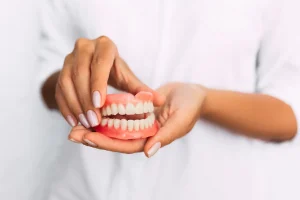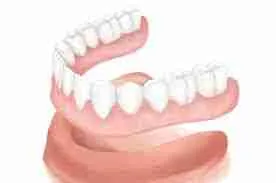If you are interested in Types of Dentures and Cost, this blog may help you find what you were looking for.
Dentures have traditionally been a solution to restore a set of missing teeth. Today, you can benefit from modern dentures in order to restore the form, function and aesthetics of your natural teeth.
When your dentist suggests you need dentures, the first thing you want to know is what type of dentures will suit your needs best. And, of course, you need to know what the cost of your dentures will be.
Here’s a brief guide to help you understand the different types of dentures and cost.

TYPES OF DENTURES AND COST. FIRST: HOW DO I KNOW IF I NEED DENTURES?
If a set of teeth is missing in your mouth, you will probably need to see a specialist. Prosthodontics is the field of dentistry that deals with mouth and teeth reconstruction. So seeing a prosthodontist will surely be the best recommendation if you want your natural teeth to be restored in the best and most effective way.
On your initial visit to your dentist or prosthodontist, you need to get a comprehensive exam. This diagnostic process is the first step to check your teeth, gums and surrounding tissues.
If you have a set of teeth missing, you can discuss with your doctor if dentures are the suitable treatment for you.
DENTURES: FIRST SIGNS TO WATCH
It is always essential to have a consultation with your dentist before you start a treatment plan.
However, some warning signs may predict you may need to wear dentures in the future.
These Signs May Include:
- Missing teeth
- Severe pain or toothache
- Swollen/red gums
- Loose teeth
- Difficulty when chewing or biting

OK, I NEED DENTURES. WHAT TYPE OF DENTURES SHOULD I GO FOR?
When you need dentures, the first thing you have to decide with your doctor is the type of dentures you want or need.
Basically, you need to know all about the types of dentures and cost.
Luckily, there have been lots of advances in modern dentistry in this field. Today, they can be digitally made at dental labs and fixed by dental implants. Digital manufacturing allows dentures to perfectly fit your mouth without so many adjustments as in the past.
Here are the main types of dentures used in dentistry today:
FULL DENTURES vs. PARTIAL DENTURES
In broad terms, there are two main types of dentures:

Full Dentures
They take up the whole upper or lower jaw to replace missing teeth. Full dentures are designed to replace all of a patients’ teeth at once. They are usually fixed and made of acrylic.

Partial Dentures
Partial dentures are used to replace a set of teeth, but not the entire set of upper or lower teeth.
They are made and designed to restore a part of your mouth.
Partial dentures can restore that part of your mouth that is making you feel so uncomfortable due to the lack of teeth and the impossibility to chew, bite or even smile properly.
REMOVABLE DENTURES vs. FIXED DENTURES
Removable Dentures
They are generally complete dentures that replace your whole set of upper or lower teeth.
These are the types of traditional dentures you may picture inside a glass of water on your night table. Removable dentures need to be cleaned at night in water or with denture cleansers to avoid drying out.
As a patient, you may need some time to get used to your removable dentures, when speaking, chewing or smiling.
ADVANTAGES:
- You can regain a nice smile at a lower cost
- You will be able to chew, speak and smile again
- Easy to clean at home
- Easy to adapt, within 1 or 2 weeks.
DISADVANTAGES:
- Removable dentures need daily cleaning and removal
- Removable dentures can bring along embarrassing situations if they come out unexpectedly
- Nutrition can be affected due to difficulty to eat
- Removable dentures that are not implant- fixed to the jaw can lead to bone loss.
Fixed Dentures
They are typically made on an acrylic base that resembles your natural gums. They cover your jaw and the artificial teeth fit over your gums.
With the advance of implant treatments in dentistry, fixed dentures have become a solution to avoid the discomfort of removable dentures coming out of your mouth, or the use of adhesives to keep the denture in place. Fixed dentures can be fitted by implant support treatments such as All-On-4®, or by a fixed implant reconstruction with dental crowns.
ADVANTAGES:
- You forget about the discomfort of dentures coming out and embarrassing situations
- They hold your jaw and bone structure, making your facial features remain in place
- Fixed dentures restore your missing teeth in a safe and stable way
- They improve your smile and enhance self confidence as they look more natural
DISADVANTAGES:
- The cost of fixed dentures is of course higher than that of removable dentures
- You need to have implants placed to fix your dentures permanently that means it is a surgical process
- You need more office visits for maintenance and cleaning since this cannot be done at home.
Types of Dentures and Cost
As mentioned above, complete or partial dentures can restore your teeth.
The advantage of fixed dentures is that they are safely attached to your jaw. This provides more stability and comfort for your daily life. (Although they do require a surgical longer procedure)
Removable dentures can be less costly, though they do require daily cleaning and more time to adapt.
WHAT MATERIALS ARE DENTURES MADE OF?
Today, different types of materials can be used to replace your lost teeth, and give you back a natural looking smile.
Broadly speaking there are three different materials are used in complete or partial dentures, including:

1. Acrylic Resin Dentures
Acrylic resin dentures are pink colored in order to resemble the gum. Teeth are resin colored to resemble that of natural teeth.
⊕Less expensive than porcelain dentures, lighter and easier to adjust.
−But, may wear down more quickly than porcelain and thus durability is shorter. Replacement be done between 5-8 years

2. Porcelain Dentures
Porcelain is harder than acrylic. This makes dentures more durable.
Also, porcelain dentures provide excellent aesthetics since the replacement teeth look a lot more like natural teeth. This material is better for bearing the daily wearing of teeth while we talk, chew or bite.
⊕Durability and Aesthetics
−But, they are more costly and prone to breaking due to accidents.

3. Metal Dentures
Metal dentures mean that the clasps of the dentures, or the palate layer of the denture is made of metal. Usually cobalt chrome is used for metal dentures.
⊕Durability and long lasting nature.
−But, poorer aesthetics since the metal color can be easily noticed.
4. Other Flexible Materials for Dentures

In some cases other flexible materials can be used to manufacture dentures.
Materials including polycarbonates and polypropylene are used for making dentures. These flexible materials make dentures more adaptable to your mouth and this means more comfort to the patient.
⊕Much more comfortable than other types of dentures.
−But, flexible materials can be more likely to build up bacteria in or around the prosthesis.
How Are Dentures Made Today?
Digitally Made Dentures
Dentures, as many other restorative treatments, have highly benefited from the advances in technology in the field of dentistry. The clinical aspect as well as the digital process of dentures is very important when you are getting dentures.
With the use of T-Scan technology, today dentures can be made from start to finish digitally. The old molds can be replaced by 3D images that recreate the exact features of your mouth. Then the dentures are designed and printed based on the data provided by the digital technology.

Digitally made dentures provide:
- perfect fit
- a natural looking smile
- data that is saved digitally. So dentures can be made again if they break accidentally.
How Much Do Dentures Cost?
It is difficult to estimate the cost of your dentures before you see your dentist. Each patient has different needs, wants, and budget.
The cost will vary depending on the type of denture you need, the number of missing teeth you have, and the whole treatment required for your restorations.
However, the following information can give you a rough idea about the cost of dentures:
The initial consultation can run between $ 85-110, though costs may rise if you need updated x-rays (but you can always take your previous x-rays if they are about 2 years old.)
Remember it is difficult to establish the cost of your treatmente without a doctor seeing you first. Costs will vary according to treatmentes, and treatments may vary according to:
- Your oral conditions at the moment of the treatment (if you need bone grafting or have some teeth removed, for example)
- Your insurance coverage
- Lab materials used
So, broadly speaking we may estimate that
- Complete or full dentures may range between $ 1500-5000
- Partial dentures could be half
- Snap-on or implant dentures (such as All-on-4) may more costly as they involve implant placement.
Does Insurance Cover Permanent Dentures?
Depending on the dental insurance you have , and the type of plan, your dental insurance should cover at least some part of your dentures treatment. If your plan is full coverage it will probably cover the whole treatment. So make sure you get the right information at your insurance company to know how much out of pocket money you will need to spend.
What is the Cost of Dentures When Going to an In-Network vs Out-Of-Network Dentist?
The cost of dentures will also vary depending on whether you go to an in-network vs an out-of-network dentist. Even if your dental insurance covers 50% of your treatment in both in-network and out-of-network dental offices, in an out-of-network office you will have to pay more out of pocket money.
In-network dental offices are contracted with insurance companies and must abide by a fee schedule. Out-of-network dental offices are not contracted with any insurance company so their fee schedule is not restricted.
However, you shouldn’t make a healthcare decision based solely on out of pocket cost. Usually an out of network office will use the best labs , the best material, the latest state of the art technology and thus will probably provide more effective treatments. So try to find an office with good reviews, and that one that is worth paying for that added peace of mind.
Also, pay attention to practices that try to make up the difference in fees by adding services you might actually not need (for example, charging for gum surgery when it’s not needed or tooth extractions).
The best option is always to visit your preferred dentist first. Office staff can always do a complimentary insurance check to find out what your dental insurance will cover.
You may also do some research to make sure your dentist’s fees are within range. But do not forget: don’t just base your oral care decision solely on price. The office staff, the doctor’s expertise and the labs and materials used are very important to avoid extra costs in the future.
Types of Dentures and Cost: What Should I Consider When Getting Dentures?
Dentures are an effective way to restore your smile and your teeth functions. That means your dentures will be your new teeth now. Certainly, you want to have a long-lasting treatment, done in the most professional and skillful way.
So, when considering types of dentures and cost try not to opt for the cheapest option first. You need to evaluate all aspects. Try to think about your particular needs, and the results in the long run. You’d better spend a bit more pocket money on a high-quality treatment that will last many years and give you peace of mind.
Try to find a professional you feel comfortable with, and for dentures, specifically remember the best option will always be a specialist in prosthodontics.
You should also check if your dentist works in-network or out-of-network. Remember that quality is the main thing you need to consider when renewing your teeth and smile. Good quality work and restoration will help you achieve an overall improved experience and avoid further costs and problems in the future.
Types of Dentures and Cost: FAQs

What Is the Cost of Dentures and Partials?
The cost will vary depending on whether you need a full set of dentures (upper and lower), the type of dentures and oral conditions (ie if you need extractions or a replacement denture). Partials tend to be significantly lower priced than dentures. Prices may vary according to the types of materials used, too. We use the best labs in the country (the same labs some Hollywood celebrities use) so our dentures fees tend to reflect that added quality. If you have dental insurance, your plan should cover some of the treatment.
What Are Dentures Made of?
Today, dentures are made of Acrylic, a rigid material made of resin. This material allows the denture to look naturally pink for the base and gums. The replacement teeth will look just like natural teeth as they are made of enamel colored acrylic.
Are Dentures Permanent?
There are different types of dentures. Fixed and removable dentures are options that satisfy different needs according to each patient’s oral conditions. Fixed dentures are supported by dental implants. That means they stay fixed and anchored in your jawbone. This kind of dentures is considered permanent. On the contrary, removable dentures need to be removed every night to be rinsed and washed with special products.
Where Can I Get Dentures and Who Makes them?
Because dentures are prosthetic treatment restorations the most qualified specialist to make and place dentures is a prosthodontist. A prosthodontist is a professional who specializes in treating missing teeth and jaw structure problems.
What Happens if My Dentures Break?
Although dentures are durable, within time, your dentures may need replacement or repairing. They may need to be adjusted or repaired. Dr. Goetz is personally involved in the creation of dentures as well as in repairing or readjusting them in case you need to do so.
